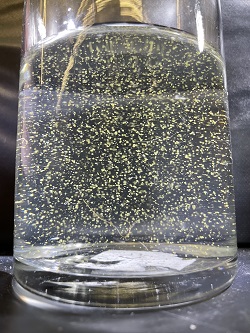Cyanobacteria
Contact
State Issues Cyanobacteria Bloom Advisory for Lake Winnipesaukee in Meredith, NH
Concord, NH - A cyanobacteria bloom has been observed in Lake Winnipesaukee, around Bear, Pine and Threemile Islands. A sample collected 9/13/22 west of Bear Island had a density of 100,000 cells/mL of Gloeotrichia, and 16,600 cells/mL of Dolichospermum (total of 116,600 cyanobacteria cells/mL). Advisories are issued when cyanobacteria cell concentrations exceed 70,000 cells/mL. As a precaution, NHDES encourages residents, to stay out of the water experiencing elevated cyanobacteria conditions, and to keep their pets out the water as well.
 The cyanobacteria, Gloeotrichia, has been reported at several locations around Lake Winnipesaukee, as is typical for this time of year. Densities in most locations remain low. However, higher concentrations have been reported over the past several days, especially in protected coves or areas open to the prevailing winds.
The cyanobacteria, Gloeotrichia, has been reported at several locations around Lake Winnipesaukee, as is typical for this time of year. Densities in most locations remain low. However, higher concentrations have been reported over the past several days, especially in protected coves or areas open to the prevailing winds.
NHDES expects that the bloom will continue for the next several days or longer depending on weather conditions and reminds the public that bloom conditions can change rapidly. For this reason, it is important to avoid contact with or use the water in areas where the water appears to have suspended particles, to be greenish in color, or to have an observed build-up of material along the shoreline. NHDES will continue to monitor the bloom and provide updates as conditions change.
Cyanobacteria are natural components of water bodies worldwide, though blooms and surface scums may form when excess nutrients are available in the water. Some cyanobacteria produce toxins that are stored within the cells and released upon cell death. Toxins can cause both acute and chronic health effects that range in severity. Acute health effects include irritation of skin and mucous membranes, tingling, numbness, nausea, vomiting, seizures and diarrhea. Chronic effects may include liver and central nervous system damage. Be cautious of lake water that has a surface scum, changes colors, or appears to have green streaks or blue-green flecks aggregating along the shore.
Remember, when in doubt stay out! NHDES advises lake users to avoid contact with and use of the water in areas where cyanobacteria advisories have been issued or are experiencing elevated cyanobacteria conditions. NHDES also advises pet and livestock owners to keep their animals from consuming or bathing in any waters that have a cyanobacteria bloom to prevent sickness. Before you head out to a lake, check out the Beach Mapper for current advisories.
The cyanobacteria advisory went into effect on September 13, 2022, and will remain in effect until NHDES confirms that cell concentrations of the bloom have subsided.
- Visit the NHDES Beach Program website for photos and more information about cyanobacteria at Harmful Algal Blooms.
- Updates on cyanobacteria advisories may be obtained on the Beach Advisory Mapper.
- Follow the Beaches twitter feed.
If you notice anything resembling cyanobacteria, please refrain from wading, swimming or drinking the water. Keep all pets out of the water and contact NHDES immediately. Please call NHDES to report a cyanobacteria bloom at (603) 848-8094 or email HAB@des.nh.gov.




